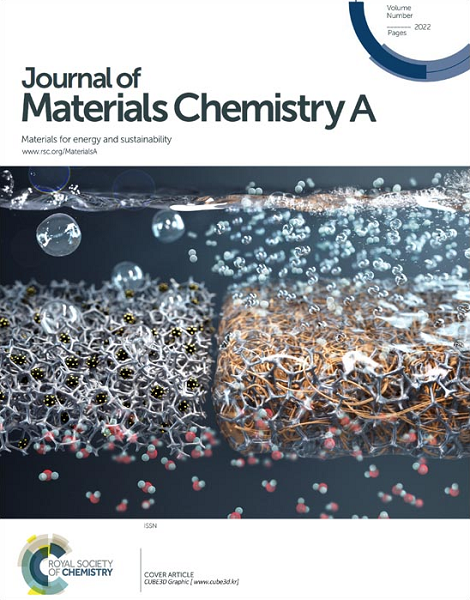Bimetallic-ions co-intercalation to stabilize vanadium-oxygen bond towards high-performance aqueous zinc-ion storage
IF 10.7
2区 材料科学
Q1 CHEMISTRY, PHYSICAL
引用次数: 0
Abstract
Aqueous zinc-ion batteries (AZIBs) have received increasing attention in large-scale energy storage systems because of their appealing features with respect to safety, cost, and scalability. Although vanadium oxides with different compositions demonstrate promising potential as the cathodes of AZIBs, the narrow interlayer spacing, inferior electronic conductivity, and high dissolution in electrolyte seriously restrict their practical applications. Here we design an ingenious bimetallic-ions (Mg2+ and Al3+) co-intercalation strategy to boost the AZIBs performances of V6O131.31H2O (VOH). The bimetallic-ions intercalation expands the interlayer spacing, increases the electronic conductivity, and more importantly stabilizes the vanadium-oxygen bond in VOH, which promotes the ion/electron transport kinetics and restrains the vanadium oxides dissolution. As expected, MgAl-VOH cathodes deliver ultrahigh specific capacities of 524.9 and 275.6 mAh g−1 at the current densities of 0.1 and 5 A g−1, respectively, comparable to the highest value in vanadium oxides. The underlying zinc-ion storage mechanism is unambiguously clarified with the aid of density function theory calculations and in-situ structure characterizations. This work opens up a new avenue for boosting AZIBs performances by designing bimetallic-ions co-intercalated cathodes.双金属离子共掺杂稳定钒氧键,实现高性能锌离子水体存储
锌离子水电池(AZIBs)因其在安全性、成本和可扩展性方面的吸引力,在大规模储能系统中受到越来越多的关注。虽然不同成分的钒氧化物作为 AZIBs 的阴极具有广阔的发展前景,但其狭窄的层间间距、较差的电子导电性以及在电解液中的高溶解性严重限制了其实际应用。在此,我们设计了一种巧妙的双金属离子(Mg2+ 和 Al3+)共掺杂策略,以提高 V6O131.31H2O (VOH) 的 AZIBs 性能。双金属离子插层扩大了层间间距,提高了电子电导率,更重要的是稳定了 VOH 中的钒氧键,从而促进了离子/电子传输动力学,抑制了钒氧化物的溶解。正如预期的那样,MgAl-VOH 阴极在电流密度为 0.1 和 5 A g-1 时可分别提供 524.9 和 275.6 mAh g-1 的超高比容量,与氧化钒的最高值相当。借助密度函数理论计算和原位结构特征分析,我们明确了锌离子存储的基本机制。这项工作为通过设计双金属离子共掺杂阴极来提高 AZIBs 性能开辟了一条新途径。
本文章由计算机程序翻译,如有差异,请以英文原文为准。
求助全文
约1分钟内获得全文
求助全文
来源期刊

Journal of Materials Chemistry A
CHEMISTRY, PHYSICAL-ENERGY & FUELS
CiteScore
19.50
自引率
5.00%
发文量
1892
审稿时长
1.5 months
期刊介绍:
The Journal of Materials Chemistry A, B & C covers a wide range of high-quality studies in the field of materials chemistry, with each section focusing on specific applications of the materials studied. Journal of Materials Chemistry A emphasizes applications in energy and sustainability, including topics such as artificial photosynthesis, batteries, and fuel cells. Journal of Materials Chemistry B focuses on applications in biology and medicine, while Journal of Materials Chemistry C covers applications in optical, magnetic, and electronic devices. Example topic areas within the scope of Journal of Materials Chemistry A include catalysis, green/sustainable materials, sensors, and water treatment, among others.
 求助内容:
求助内容: 应助结果提醒方式:
应助结果提醒方式:


